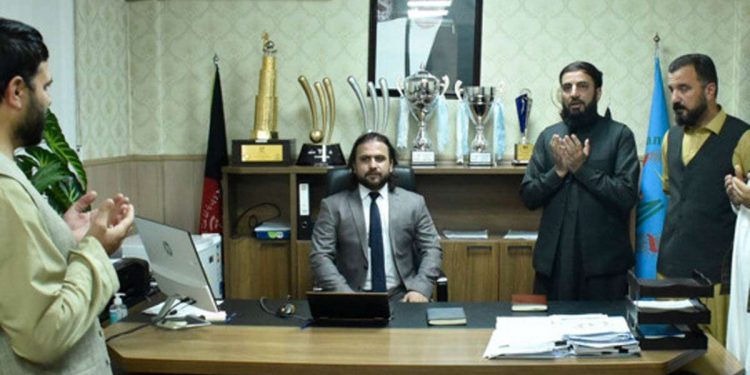In the past, it might have looked unrealistic to hold international cricket matches in Afghanistan. However, for Naseeb Khan, the CEO of the Afghanistan Cricket Board, that goal is getting closer to becoming a reality. Naseeb recently visited Bangladesh for the Asian Cricket Council Annual General Meeting. While there, he spoke with Cricbuzz about the board’s goals, which include building infrastructure, launching the second APL season, and making sure domestic cricket continues to be a breeding ground for national talent. Excerpts:
Reviving the APL is being discussed. How challenging will it be to identify the ideal window that draws players from abroad, given the abundance of franchise leagues worldwide?
Sincerely, we think that October through November is the best window for the second edition of the APL, and that is still a strategic decision for us. There are fewer franchise leagues in the world around this time, and the Middle East, where we plan to hold the tournament, has very cricket-friendly weather. Finding the perfect partner has always been the biggest obstacle, but I’m happy to report that we have it figured out today. The APL will undoubtedly gain international attention because to the continued success of our indigenous players on international stages. We think that deliberately cultivating our connections with other cricket boards regarding player release will help us secure NOCs for players from other countries. Afghanistan’s cricket is already regarded as being of high level, and the APL will give both domestic and foreign players another exciting and competitive stage.
Where will the APL be hosted?
Most likely in the United Arab Emirates, which is still our top choice and is being discussed with our partner. We have, however, retained Oman and Qatar as contingency plans to prevent more delays in the league’s introduction. These locations have a sizable Afghan diaspora and first-rate amenities, which naturally attracts fans.
Afghanistan cricket is still dominated by the Shpageeza T20 League. Are national players required to participate?
Indeed, taking part in Shpageeza is regarded as a national obligation. The framework is more robust than ever in its tenth edition. It has been a key component of our domestic cricket since its start thanks to the backing of supporters, players’ dedication, and management’s involvement. Finding up-and-coming talent has been made possible in large part by Shpageeza. Our triumph at the Emerging Asia Cup, when standout players like Sediqullah Atal, Zubaid Akbari, and Allah Mohammad Ghazanfar travelled directly from Shpageeza, is a recent example. By overcoming clubs with seasoned professionals with international league experience, these young players have already established themselves. It is a clear indication of how well our home system is working. Our top players find time to play in this league despite their international obligations because they understand its significance and their duty to engage with supporters and motivate the next generation.
Is the Afghan team’s greatest strength their close ties to their homeland? It means a lot when athletes like Rashid Khan make time for Shpageeza in spite of their busy schedules.
Of course. Rashid, Nabi, Naveen, Gurbaz, and Hashmat are among the many of our players who are actively engaged in community service. In Afghanistan, they manage their own cricket academies and humanitarian institutions. Giving back and remembering their roots are more important than cricket alone. Our greatest strength is our connection to home. It’s important to note that our national heroes have always supported the populace in difficult times and amid natural disasters. Their assistance and presence extend beyond the field.
Mohammad Nabi‘s playing days are coming to an end. Do you think he’ll play a different role at the ACB again?
He has the final say on that matter. However, considering his performance and level of fitness right now, I believe he still has more to offer as a player. Nevertheless, I would be more than happy to have him return in a coaching or mentoring capacity. As coaches for the senior and U-19 teams, we already have precedents like as Hameed Hassan and Noor Ali Zadran. Our technical framework would greatly benefit from Nabi’s leadership and experience.
The coaching and captaincy positions appear to be more stable currently. Has the team’s recent success been influenced by that?
Definitely. The key has been stability. Hashmatullah Shahidi has been the team’s coach for five years, and Rashid Khan has been captaining in important formats. Jonathan Trott has been the team’s head coach for more than three years. The team now has clarity, focus, and togetherness thanks to the board’s backing and the club’s top leadership’s consistency. The government also extended my and our Chairman’s terms for a another three years, which allows us to finish the long-term objectives we’ve started.
Do you think Afghanistan will soon be able to host international cricket matches?
Indeed, that is a plausible scenario. Conflict prevented us from hosting home matches in numerous provinces prior to 2021. Thankfully, however, there is now peace throughout the nation. We just hosted a three-day event in Helmand, close to Iran, and the Wakhan T20 Cup in Kunduz, close to the Tajikistan border. These incidents demonstrate our progress. I firmly believe that Afghanistan will host international cricket in the next three to four years, if security continues to improve and the world cricket community continues to support the country.
However, is the necessary infrastructure in place to achieve that goal?
Even though we only started playing international cricket 15 years ago, we already have 8–10 top-notch cricket grounds spread throughout the provinces of Kabul, Jalalabad, Kandahar, Khost, Zabul, Paktia, Kunar, and Kunduz. That is a tremendous accomplishment in and of itself. We are working with the governments of Qatar, the United Arab Emirates, and India to secure funds and expedited upgrades in order to overcome our financial limitations, mostly due to the high expense of hosting home games overseas. We anticipate that, with sustained work and international assistance, our infrastructure will soon be up to par with world standards.







